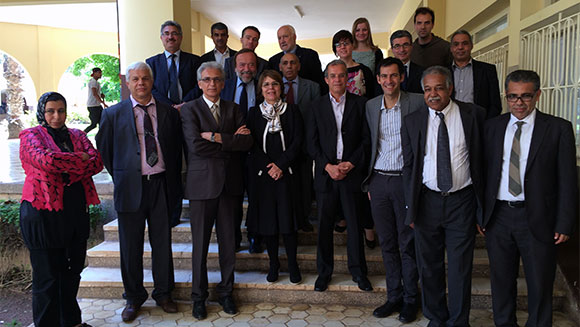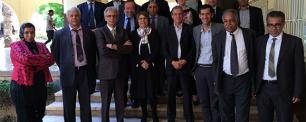MENFRI brings together experts to cooperate towards a profitable and sustainable use of forests in the Mediterranean
On May 26th 2014, experts from different countries and background (industry, policymaking, science, NGOs, etc) gathered in Morocco in the framework of the project “Mediterranean Network of Forestry Research and Innovation” (MENFRI) to assess the forestry sector organization and development opportunities in Mediterranean countries.

MENFRI is a EU funded research project aiming at fostering international cooperation amongst the Mediterranean region in the field of forestry. By setting up a discussion platform, MENFRI aims at exchanging best practices, contacts and knowledge, and at promoting the Mediterranean forestry as an innovative and job creating sector able to face global changes.
We observe a trend of abandonment in terms of forest management and maintenance in the northern Mediterranean, increasing therefore fire and pest risks, as the project manager, Enrique DOBLAS from CREAF, explained. In the southern part, overgrazing and desertification are the main threats. Chateaubriand illustrated perfectly this problematic: “Forests precede men, deserts follow ».
The MENFRI project sustains that initiatives in the search of sustainability should come along with profitability.
Profitability is possible thanks to resources diversity and the valorisation of Mediterranean high quality products. “We have to show the Mediterranean forest’s economic added value and the potential growth coming from the sustainable exploitation of its products and by products” noted Mr. Gaston FRANCO, Member of the European Parliament. Indeed, climate change impacts have important repercussions on business functioning and growth, but also on the society as a part of the forest ecosystem. That is why Mrs. Rachida NAFAA, Dean of the Faculty of Humanities from Hassan II University in Mohammedia, underlined the importance of aligning research, technical and economic objectives with a society vision.
The lack of political coherence and visibility of forestry policies was stressed by Mr. Nicolas LUIGI, Forest manager and PRO Sylva France General Delegate, and Mr. Joan ROVIRA, from the Catalan Private Forest Owners Association (CFC). For them, this is as an important obstacle to coordinated and coherent actions. In addition, few financial resources are invested in the sector for business creation and prosperity, and for material and specific methodologies. Mediterranean forest owners and forestry-related SMEs need to be fully integrated in the conservation of forest services in order to revitalize the sector, they added.
The workshop participants concluded that in order to reach an optimal forest management, a training programme, a better communication and applied and multidisciplinary research should have to be implemented on the ground.
Aside from the MENFRI team, this meeting gathered forestry and cooperation experts from both northern and southern countries including: Mr. Danilo MONARCA from Tuscia University; Mr. Gaston FRANCO; Mr. Youseff SAADANI, General Director of the Tunisian Agricultural Ministry of Forests; Mr. Rafael RODRÍGUEZ from the Spanish National Research Council; Mr. Mohammed BENZYANE, expert in natural resources management in BETAF consulting; Mr. Nicolas LUIGI; and Mr. Mhammed BOUHALOUA, professor at the Hassan II Agronomics and Veterinary Institute and Mr. Zaki AHLAFI, independent forestry expert.







